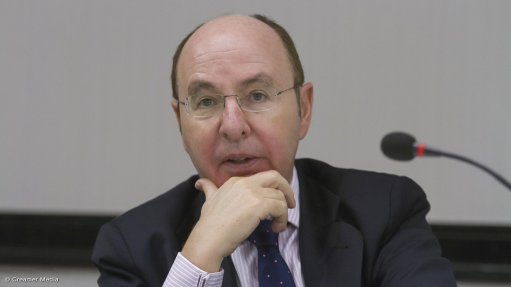
Herbert Smith Freehills Africa co-chair and partner Peter Leon.
Photo by: Duane Daws
JOHANNESBURG (miningweekly.com) – The process of reconsidering the Mineral and Petroleum Resources Development Act (MPRDA) Amendment Bill has generated a new range of procedural missteps and failed to address any of the substantive problems in the Bill, leaving the entire withdrawal of the Bill as the only constitutionally acceptable solution, says Herbert Smith Freehills Africa co-chair and partner Peter Leon.
Delivering the keynote speech to investors at MineAfrica’s eleventh Investing in African Mining seminar in London, Leon said that despite the failings of this country’s State executive and legislature, the wider investment community could confidently rely on the third branch of State, the judiciary, to hold the other branches to the discipline of the Constitution.
He cited the track record of South Africa’s judiciary in upholding good governance and international obligations as an obstacle standing in the way of the aberrant MPRDA Amendment Bill’s enactment.
“The courts have not hesitated to intervene when the executive or the legislature have violated the Bill of Rights, the principles of good governance, or even the country’s international obligations,” he assured investors.
Not only would the proposed MPRDA Amendment Bill likely contravene South Africa’s international obligations as a member of the World Trade Organisation, but the granting of such wide powers to the executive was unlikely to pass constitutional muster, Leon told the international audience.
“The only constitutionally acceptable solution now is to withdraw the Bill entirely,” said Leon, who expressed the hope that Zimbabwe’s recent change in leadership, after thirty-seven years of dictatorial rule by Robert Mugabe, would remind South Africa’s would-be leaders of the fate that awaits those who pursue economic nationalism and personal enrichment over a social market economy under the rule of law.
He noted that Deputy President Cyril Ramaphosa, who holds the edge in the race to become the next leader of the African National Congress (ANC) at its fifty-fourth National Elective Conference in Gauteng from December 16 to 20, subscribed to a social market-based strategy of “inclusive growth”.
He said that appreciating how South Africa’s economy had slumped to a near standstill and deciding how best to emerge from this would be important sites of contestation at next month’s elective conference and warned that South Africa’s current position as a net capital exporter “simply cannot be sustained”.
While the ANC delegates’ choice next month would go some way towards answering the question ‘quo vadis, South Africa?’, it would not tell the whole story, “as South Africa has strong public and private institutions, which will, under whatever political leadership, continue to help shape the country’s economic destiny”, Leon added.